Venue Information
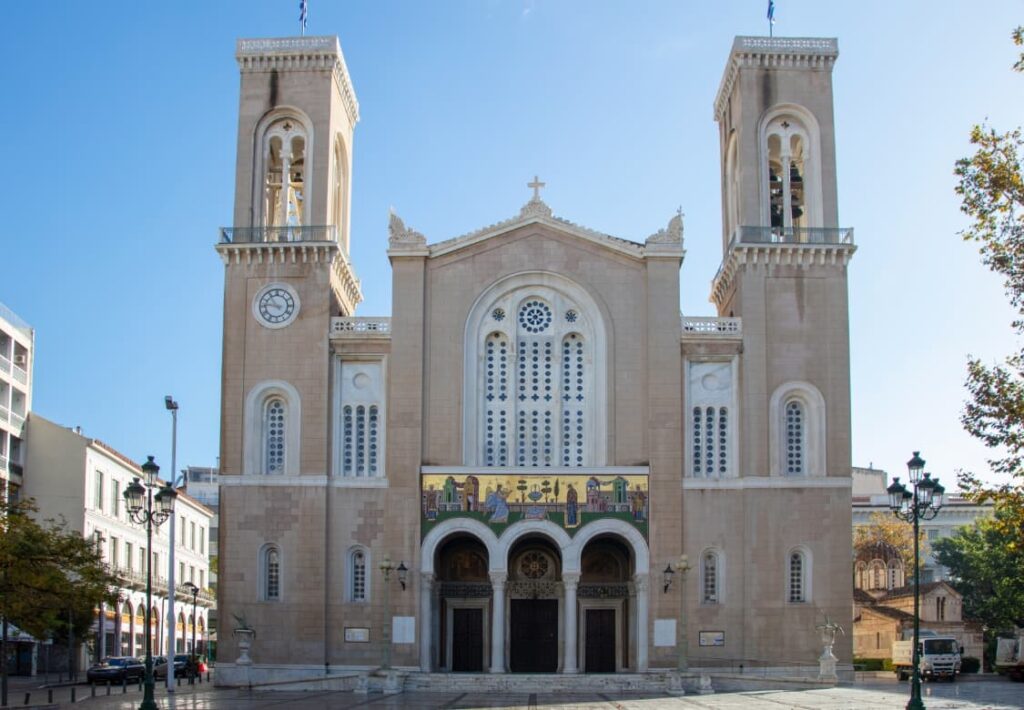
Metropolitan Cathedral of Athens
The Metropolitan Cathedral of Athens, also known as the “Cathedral of the Annunciation,” stands as a beacon of faith and architectural splendor in the heart of the Greek capital. Constructed in the 19th century, this majestic cathedral is a testament to the enduring spiritual devotion of the Greek Orthodox faithful. Its striking neoclassical façade, adorned with intricate reliefs and majestic bell towers, commands attention amidst the bustling streets of Athens. Inside, the cathedral’s soaring arches, ornate iconography, and golden-hued interiors inspire reverence and awe. As the seat of the Archbishop of Athens and All Greece, the Metropolitan Cathedral plays a central role in the religious life of the nation, hosting solemn liturgies, religious ceremonies, and cultural events that unite believers and visitors alike in worship and contemplation. With its timeless beauty and spiritual significance, the Metropolitan Cathedral of Athens stands as a cherished symbol of Greek Orthodox tradition and a testament to the enduring power of faith.
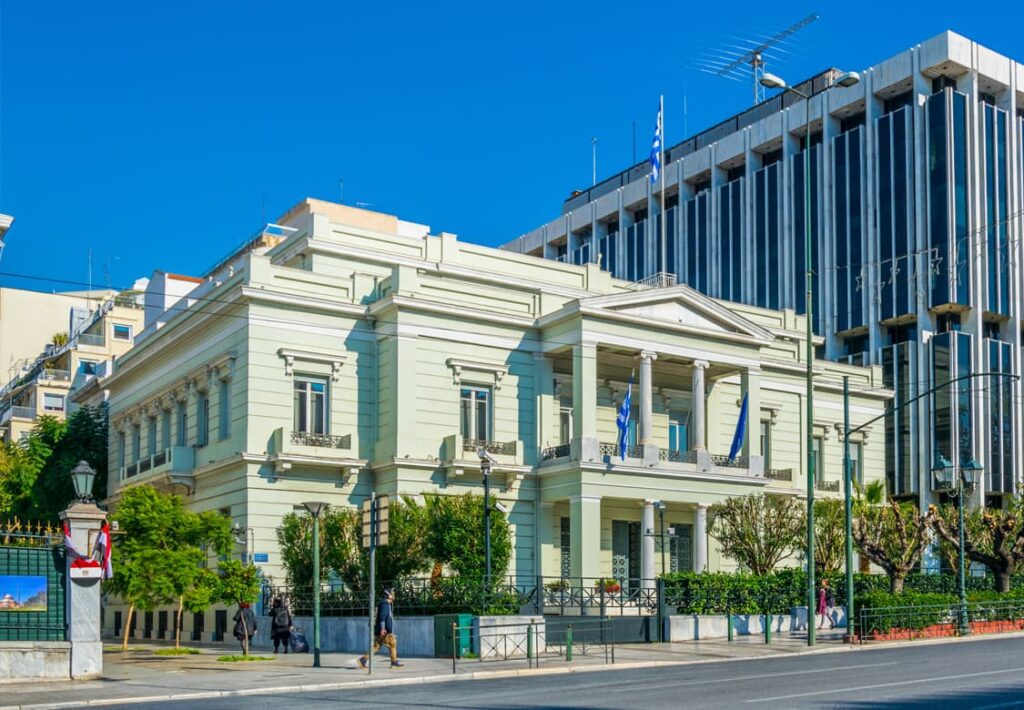
Ministry of Foreign Affairs
Housed in a landmark building on Akadimias Street, designed by architect Alexandros Nikoloudis, the ministry’s headquarters is an architectural masterpiece blending neoclassical and modern elements. Completed in the late 19th century, it features grand columns, intricate detailing, and serves as a hub for diplomatic activities, hosting meetings, conferences, and official ceremonies. This iconic structure reflects Greece’s diplomatic heritage and enduring commitment to international relations. The Ministry of Foreign Affairs in Greece plays a pivotal role in shaping the country’s international relations. As the primary governmental body responsible for managing Greece’s interactions with other nations, it focuses on promoting the country’s interests abroad, fostering cooperation, and advancing diplomatic initiatives. Its wide-ranging responsibilities include representing Greece in negotiations, overseeing consular affairs, and formulating foreign policy strategies aligned with national interests.
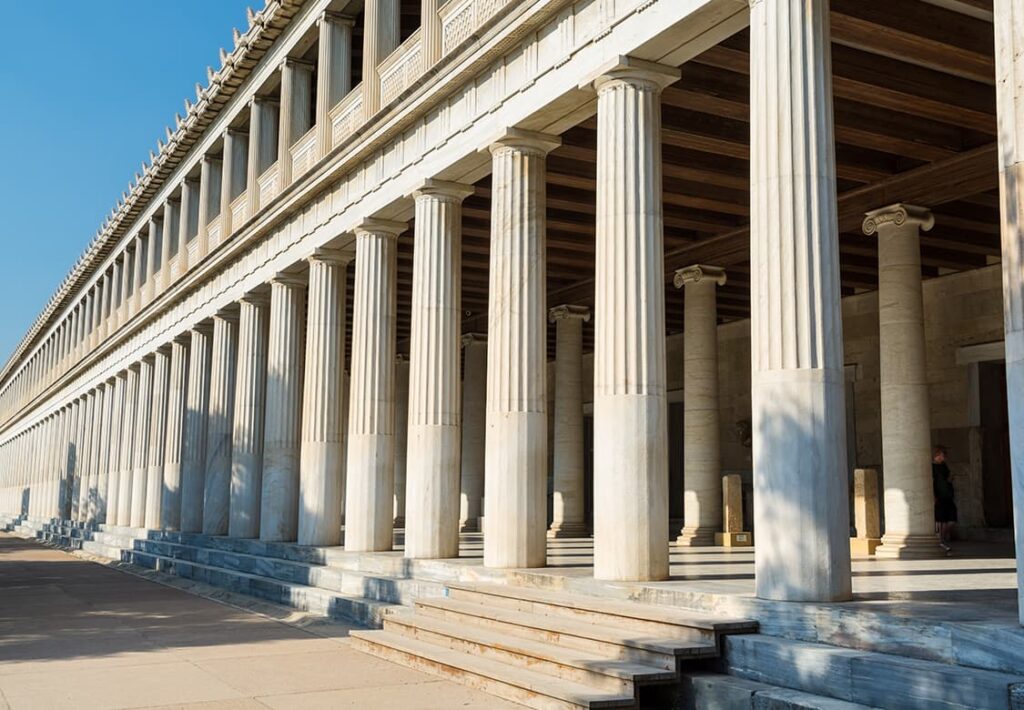
Stoa of Attalos
The Stoa of Attalos, a marvel of ancient Greek architecture, stands proudly in the heart of Athens. Reconstructed in the 1950s by the American School of Classical Studies at Athens, this majestic colonnaded building pays homage to its original incarnation, which was commissioned by King Attalos II of Pergamon in the 2nd century BC. The Stoa’s imposing façade, adorned with Doric and Ionic columns, once served as a bustling marketplace, and gathering place for Athenians, offering shelter from the scorching sun and sheltering countless stalls and shops. Today, meticulously restored to its former glory, the Stoa of Attalos serves as a museum housing a rich collection of artifacts and exhibits, offering visitors a glimpse into ancient Athenian life and commerce. With its timeless beauty and historical significance, the Stoa remains a cherished landmark and a testament to the enduring legacy of classical Greece.
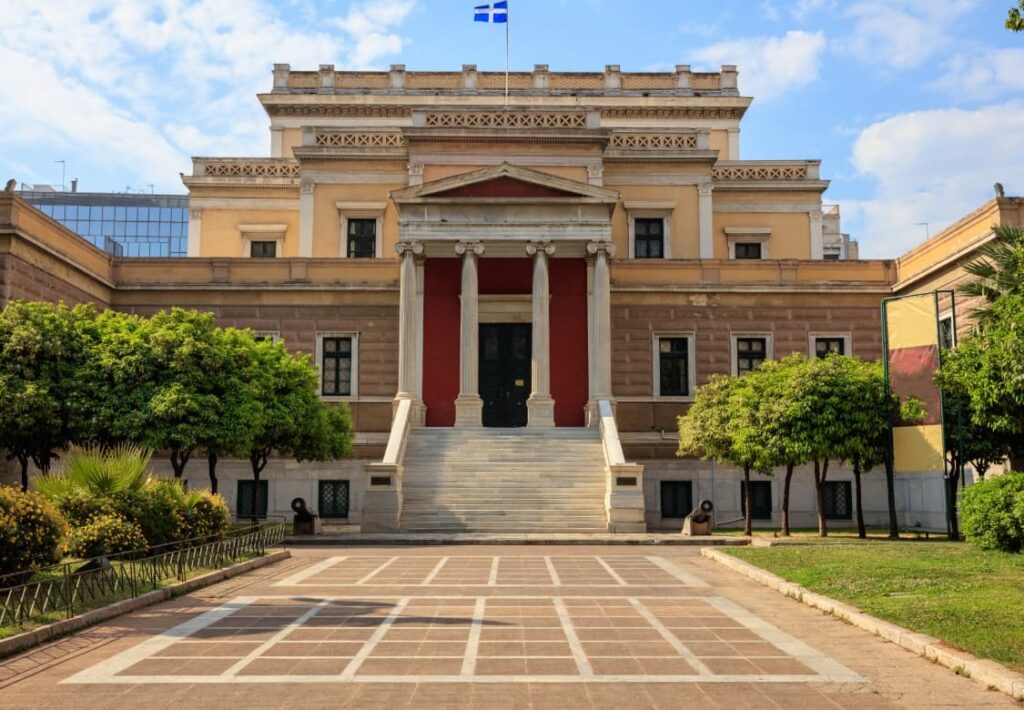
The Old Parliament
The Old Parliament Building of Athens, also known as the “Old Palace,” stands as a symbol of Greece’s journey towards democracy and independence. Completed in 1843, this neoclassical masterpiece was originally constructed to house the Royal Palace during the reign of King Otto. However, it soon became the epicenter of Greece’s political life when it served as the home of the Hellenic Parliament from 1875 to 1935. With its grand Ionic columns and elegant architecture, the building exudes a sense of grandeur and historical importance. Inside, ornate chambers and halls witnessed pivotal moments in Greek history, including debates on constitutional reforms and declarations of war. Today, the Old Parliament Building serves as the National Historical Museum, preserving artifacts and documents that chronicle Greece’s struggle for independence and the evolution of its democratic institutions. As a revered landmark in the heart of Athens, it continues to inspire visitors with its rich history and enduring commitment to democratic ideals.
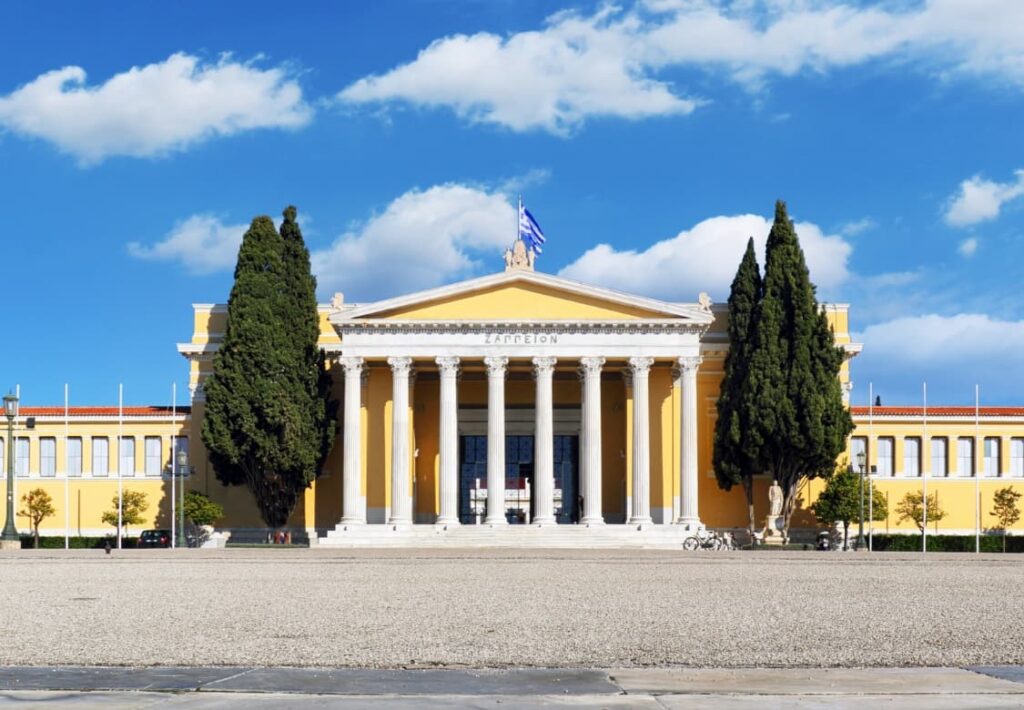
Zappeion
The Zappeion Hall, a timeless gem nestled amidst the historic heart of Athens, embodies the spirit of Greek heritage and cultural revival. Designed by Danish architect Theophil Hansen and completed in 1888, this majestic structure was the visionary creation of Greek patriot Evangelis Zappas, who dedicated his life to rekindling the flames of ancient Greece’s Olympic glory and promoting the arts. Over the past century, the Zappeion has stood witness to countless significant cultural and historical events, serving as a symbol of national pride and unity. With its neoclassical architecture, adorned with intricate details and graceful proportions, the Zappeion continues to enchant visitors from around the world. Today, it remains a vibrant hub of cultural activity, hosting prestigious events, conferences, and exhibitions that celebrate Greece’s rich cultural heritage and intellectual legacy. As an enduring icon of Greek civilization, the Zappeion stands as a testament to the enduring legacy of those who sought to revive the spirit of ancient Greece for generations to come.
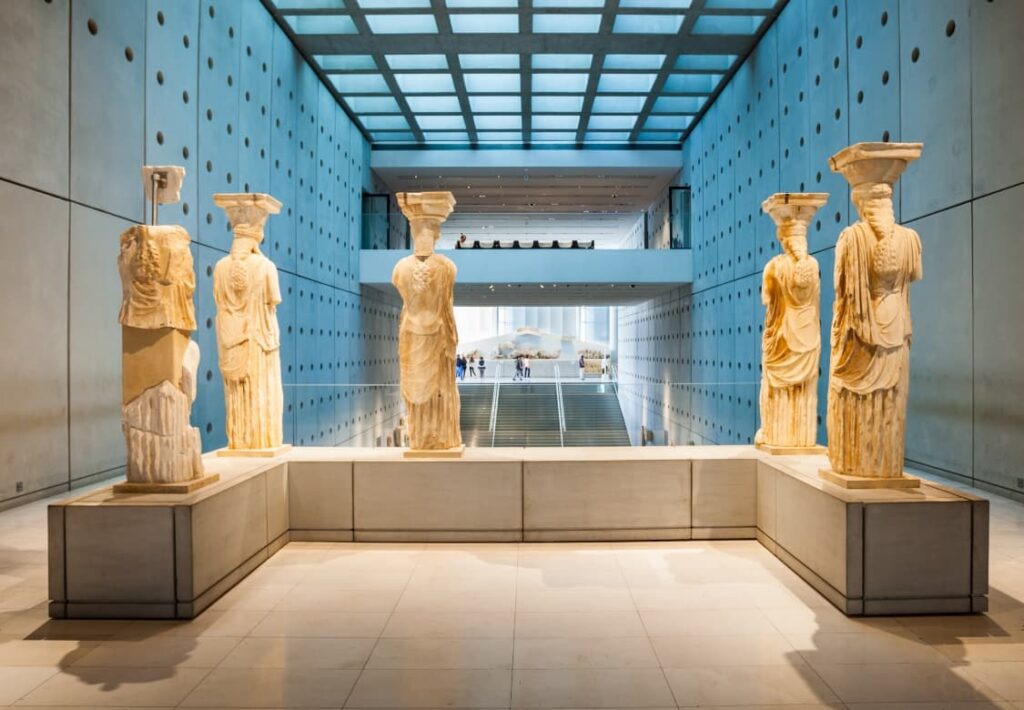
The Acropolis Museum
The Acropolis Museum, a modern marvel nestled in the shadow of the ancient Acropolis in Athens, Greece, stands as a testament to the enduring legacy of classical civilization. Designed by architect Bernard Tschumi and opened to the public in 2009, this state-of-the-art museum showcases the rich archaeological treasures unearthed from the Acropolis and its surrounding areas. With its sleek glass exterior and expansive interior spaces, the museum provides a stunning backdrop for the display of ancient artifacts, sculptures, and architectural fragments dating back to the Golden Age of Athens. Visitors are transported on a journey through time as they explore the museum’s meticulously curated galleries, which offer unparalleled insights into the artistic achievements and cultural significance of ancient Greece. From the iconic Parthenon Marbles to the intricately carved Caryatids, each exhibit serves as a poignant reminder of the enduring influence of Greek civilization on the world stage. With its immersive exhibits, educational programs, and panoramic views of the Acropolis, the Acropolis Museum stands as a beacon of cultural heritage and a testament to the timeless beauty of ancient Greece.
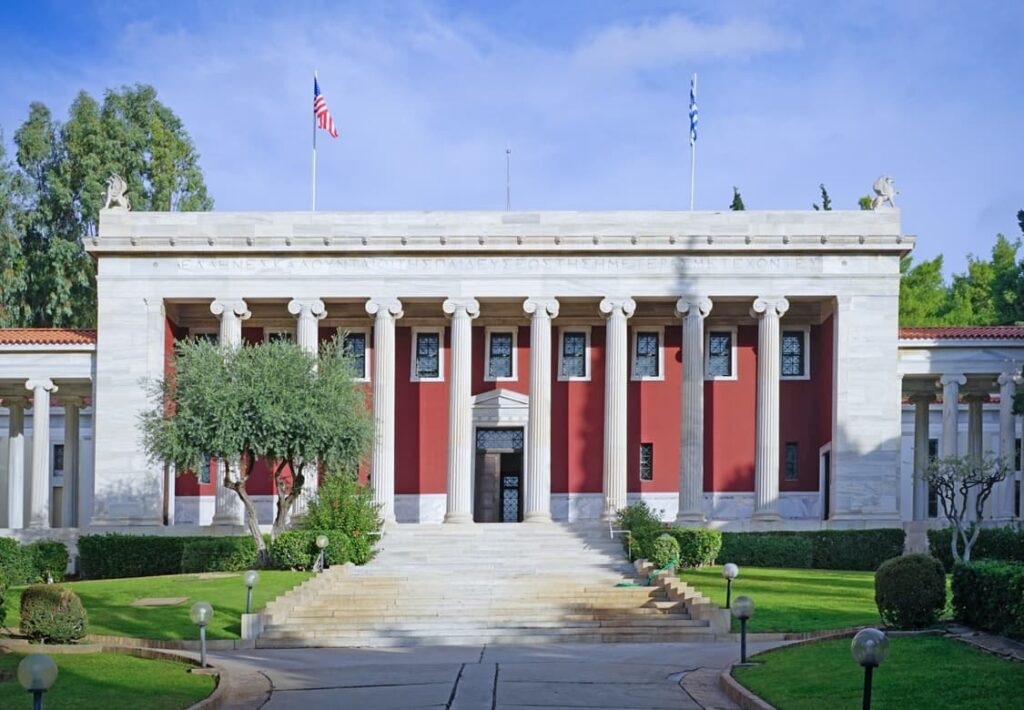
The American Classical School of Studies
The American School of Classical Studies at Athens (ASCSA) stands as a beacon of scholarship and cultural exchange in the field of classical studies. Founded in 1881, this esteemed institution has played a pivotal role in advancing research and education in Greek archaeology, history, and language. Located in the heart of Athens, the ASCSA’s world-class facilities, including its renowned library and archaeological resources, attract scholars, students, and researchers from around the globe. Through its fieldwork projects, academic programs, and publications, the ASCSA continues to contribute to our understanding of the ancient Mediterranean world and its enduring impact on contemporary society. As a hub for interdisciplinary collaboration and intellectual inquiry, the ASCSA remains committed to preserving and promoting the rich cultural heritage of Greece for future generations.

